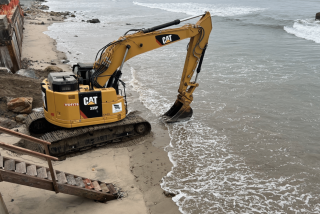Court Opens Fenced Beach to Public Use
A pristine section of Malibu beach that homeowners want to keep fenced off must be opened to the public, the California Court of Appeal has ruled.
Overturning a lower court decision, the appellate court said Thursday that an 80-foot swath at the north end of La Costa Beach may be opened, complete with a viewing platform and a stairway from Pacific Coast Highway to the sand.
Coastal activists hailed the decision and said it set a strong precedent for opening other areas to visitors.
“It’s outstanding,” said Peter Douglas, executive director of the California Coastal Commission. “And this is obviously going to be very important in terms of potential future litigation.”
Representatives of the La Costa Beach Homeowners Assn., which has sought to keep the beach closed, were unavailable Friday, as were their attorneys.
They have argued that the stretch of PCH is too dangerous for parking, that the ocean there has treacherous riptides and that the Coastal Commission had no right to obtain that section of beach for public use.
Specifically, they claimed that the commission acted illegally when it allowed businessman Eli Broad, Nancy Daly Riordan (wife of the former Los Angeles mayor) and television magnate Haim Saban to donate that piece of land in exchange for the right to expand their own beachfront houses a mile or so down the sand.
Under the deal, the land would be developed and maintained by the California Coastal Conservancy, sister agency to the commission.
Last year, a Los Angeles County Superior Court judge agreed with the homeowners, saying that so-called off-site mitigation was not permitted under the 30-year-old Coastal Access Act.
But this week, the Court of Appeal overturned that decision, ruling that the Coastal Commission has a mandate to maximize public access whenever possible. The decision can be appealed to the state Supreme Court.
The La Costa Beach Homeowners Assn. has filed another lawsuit against the Coastal Conservancy, again alleging that the conservancy’s acceptance of the land was not consistent with the Coastal Access Act.
That lawsuit was put on hold pending the resolution of this case. If that lawsuit prevails, Broad, Daly and Saban have set aside $1 million to improve access elsewhere.
But access activists hope that won’t happen, while at the same time acknowledging that the fight for public access in Malibu is by no means won.
Much of the beautiful, jagged, 27-mile coastline is taken up with expensive houses that show a closed face to the highway but open onto the beach as if it were a private backyard. Legally, everything seaward of the mean high-tide line is public property.
Residents say they fear for their security, as beachgoers have been known to march over that line into private homes, or use their personal property to compensate for the lack of public restrooms.
The fight over access in Malibu goes back more than 100 years. In the early decades of the 20th century, an eccentric widow hired armed, mounted guards to patrol the boundaries of Rancho Malibu until the U.S. Supreme Court in 1925 forced her to open her land to make way for Pacific Coast Highway.
In later years, homeowners promised to allow public walkways in exchange for building permits. In many cases, however, the walkways never were built. But now, as the commitments are about to expire, groups are taking steps to open them up.
Late Friday evening, the Legislature approved a bill that would require the Coastal Conservancy to assume control of any access ways that are in danger of reverting to the homeowner because the agreements will expire. The bill is now headed for the governor’s desk.
But lawsuits have greeted attempts to create access in the past. Entertainment mogul David Geffen earlier this summer sued a nonprofit group and state officials who have been trying to open his wooden gate so visitors can reach the beach. A similar legal battle is underway in Santa Barbara.
“Is this the end of the fight? Nah,” said Steve Hoye, executive director of Access for All, a group that fights for public beach use. “The homeowners have had these beaches for many years.... It will be a beach-by-beach struggle.”
More to Read
Sign up for Essential California
The most important California stories and recommendations in your inbox every morning.
You may occasionally receive promotional content from the Los Angeles Times.










